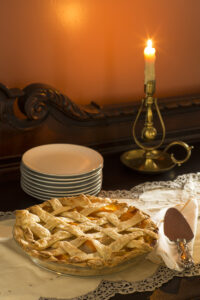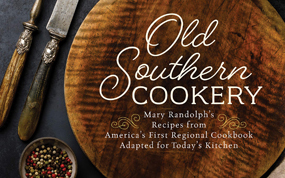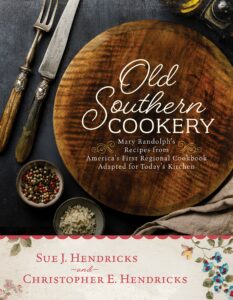Guest Lecture
The Rice Pie: Gender, Race, and Material Culture in the Old South
Prof. Christopher Hendricks (Georgia Southern University)
| Abstract of Lecture
Among the more than four hundred recipes included in Mary Randolph’s 1824 cookbook The Virginia House-Wife appears one for a southern rice pie: BOIL half a pound of rice in milk, until it is quite tender; beat it well with a wooden spoon to mash the grains; add three quarters of a pound of sugar, and the same of melted butter; half a nutmeg, six eggs, a gill of wine, and some grated lemon peel; put a paste in the dish, and bake it. For change, it may be boiled, and eaten with butter, sugar, and wine. This recipe is an important historical artifact, capturing the creativity and sophistication of Southern American cooking. Her book, the first published work on Southern cooking, provides a record of both Randolph’s considerable culinary skills and her impressive business sense. This recipe in particular and the book in which it is found bring to light a type of knowledge that often remains obscured in the history record: women’s domestic craft. But hidden behind the recipe, is another story that has too often been left in the shadows: the agricultural skills of enslaved Africans, who taught their enslavers to grow the rice that became a staple in many of Randolph’s recipes and a crucial economic engine for the early South. This talk explores the complicated cultural history of Randolph’s cookbook, examining two related stories: the tale of a resourceful and talented woman determined to support her struggling family, and the story of generations of African Americans whose knowledge and skills made her success possible. This single recipe becomes a key to better understand the lives of two oppressed groups—women and African Americans—and helps explain the development of the unique culture of the American South. |

|
| Bio Sketch
Christopher E. Hendricks is Professor of History at the Armstrong Campus of Georgia Southern University in Savannah, where he has been teaching since 1993. He has worked extensively in archaeology, historic preservation, and museum interpretation with many organizations including the Colonial Williamsburg Foundation, Old Salem, Inc., and the Museum of Early Southern Decorative Arts. He is the author of numerous publications, including The Backcountry Towns of Colonial Virginia and Old Southern Cookery. He received his Bachelor of Arts in History and English from Wake Forest University and his Master of Arts and Doctorate in History from the College of William and Mary in Virginia, where he specialized in early American history and material culture. The guest lecture on Wednesday will begin at 8.15 am.
Everybody is welcome to attend! |
 |

